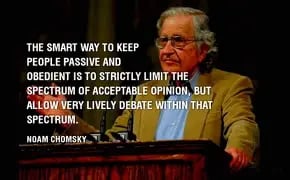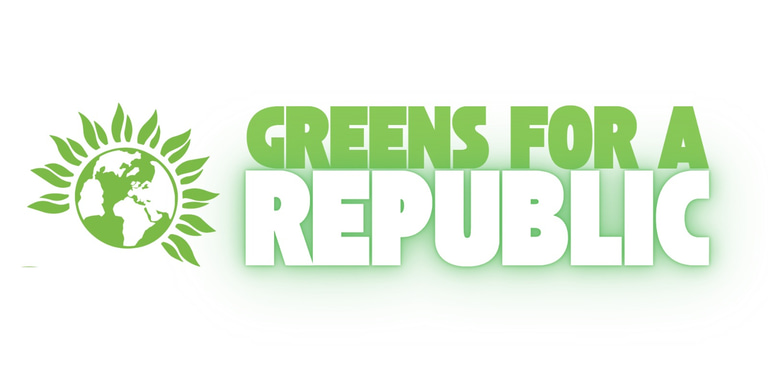The Illusion of Debate: Chomsky and the Royal Narrative
The media manufactures consent for the monarchy. Here's a deep-dive into the psychology of it all with help from Noam Chomsky.
11/9/20252 min read


What Chomsky means by “the limited spectrum of opinion”
Chomsky argues that in liberal democracies:
“The smart way to keep people passive and obedient is to strictly limit the spectrum of acceptable opinion — but allow very lively debate within that spectrum.”
In other words, the media and political system permit debate,
but only within a narrow range of viewpoints that don’t threaten the core structure of power or ownership.
Dissent beyond that range (e.g. questioning the legitimacy of institutions themselves) is marginalised or framed as “extreme,” “unpatriotic,” or “irrelevant.”
Applying this to the British monarchy
The “spectrum” in royal coverage, especially in mainstream media, and the range of acceptable opinions about the monarchy tend to run something like this:
Permitted spectrum:
“The monarchy is a cherished national institution, though perhaps it needs modernisation or slimming down.”
to
“The monarchy has flaws, certain members behave badly, but it remains a symbol of unity and continuity.”
What is largely outside the spectrum in mainstream coverage:
“Should we abolish the monarchy?
“Is hereditary power compatible with democracy?”
“Does the monarchy reinforce class inequality and empire nostalgia?”
“Why can't we follow successful ceremonial republic models like Ireland and Finland?”
Those views exist — but they are often confined to smaller publications, independent media, or framed as fringe activism rather than legitimate civic debate.
How is this limited spectrum is maintained?
a. Media dependency and royal access
The royal press offices tightly control access.
Journalists who are overly critical risk losing privileges (interviews, event invites, photo ops).
This creates a self-reinforcing incentive for media to stay within the acceptable tone — respectful critique, not fundamental challenge.
b. Cultural norms and nationalism
-The monarchy is tied to British identity and heritage.
-Major broadcasters (BBC, ITV) tend to present the monarchy as a unifying institution, especially during national moments (weddings, funerals, jubilees).
-To question its legitimacy during those moments is framed as disrespectful, not “balanced.”
c. Economic interests
-News organisations profit from maintaining public fascination rather than dismantling it.
The result: Manufactured consent
In Chomsky’s terms, this leads to a “manufactured consent” around monarchy’s legitimacy:
-People feel there’s debate (e.g. “should they modernise?” “should we pay for renovations?”),
But the fundamental premise— that the monarchy should exist — is rarely treated as an open question in mainstream discourse.
This keeps the public “engaged but contained”: emotionally invested in personalities, scandals, or reforms, without ever confronting the system’s structural meaning.
Examples in practice
Coverage of Andrew - treated as an individual scandal, not as a critique of hereditary privilege.
Debate over royal funding - focuses on cost-effectiveness (“value for money”), not on whether public funding should exist at all.
Media treatment of republicans - often framed as eccentric or bitter outliers, not mainstream citizens with rational critiques.
Why it matters
Applying Chomsky’s idea reveals that the monarchy’s stability isn’t just due to tradition or affection — it’s also maintained through a discursive boundary around what can be questioned.
The result:
-The monarchy remains symbolically untouchable in most mainstream contexts.
-Public debate is about personalities, not principles — exactly the kind of managed discourse Chomsky described.
Through Chomsky’s lens, the monarchy operates within a narrative cage. It's up to us republicans to keep reminding our fellow citizens that the door is wide open.
Feeling inspired? Email the Policy Development Committee at pdc@greenparty.org.uk
Any Green Party member can join a Policy Working Group. Help us shape a democratic future!
